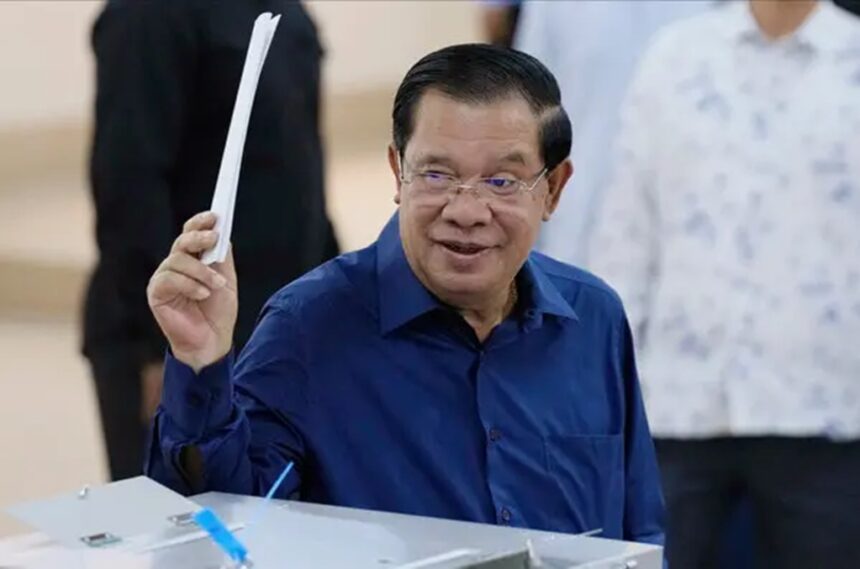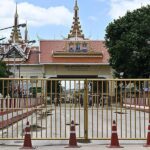BANGKOK – For almost forty years, Hun Sen has shaped Southeast Asian politics. As Cambodia’s former prime minister and current Senate president, he controlled the country with strict authority. In 2023, he passed the role of prime minister to his son, Hun Manet, but Hun Sen’s influence remains strong at home and across the region.
Recent developments point to his growing interest in Thai politics, with steps that seem designed to unsettle Thailand’s government. This has raised concerns about his involvement in Thai affairs and the effects on stability within ASEAN.
Hun Sen’s political life began when he left the Khmer Rouge in the late 1970s and joined Vietnam’s fight to remove the regime. He became prime minister in 1985 and held the role for 38 years, making him one of the world’s longest-serving leaders.
His years in power brought a steady clampdown on democracy. By using laws, threats, and violence, Hun Sen and the Cambodian People’s Party (CPP) took firm control, pushed aside rivals, and silenced critics.
Hun Sen Ends Opposition
In 2017, the Cambodian Supreme Court, widely seen as loyal to Hun Sen, dissolved the main opposition group, the Cambodia National Rescue Party (CNRP), using vague claims of plotting a “colour revolution”. Leaders such as Sam Rainsy were forced into exile, while others faced jail or ongoing harassment. Independent newspapers like The Cambodia Daily were closed, and civil society groups were heavily restricted.
Elections under Hun Sen, especially in 2018, faced international criticism, as the CPP won every parliamentary seat without real competition.
Hun Sen’s approach to power was not limited to politics. His government faced accusations of corruption, land seizures, and human rights abuses. Groups such as Human Rights Watch reported forced evictions, protest crackdowns, and killings of activists.
In 2025, an Al Jazeera report claimed Hun Sen ordered attacks on political opponents in Thailand, including the 2023 assault on activist Phorn Phanna in Rayong and the killing of former MP Lim Kimya in January 2025. These events show Hun Sen’s harsh tactics have crossed borders.
Recently, Hun Sen’s focus has shifted to Thailand. On 15 June 2025, a leaked 17-minute phone call between him and Thai Prime Minister Paetongtarn Shinawatra caused uproar in Bangkok. Hun Sen later posted the entire call on his Facebook page.
In the call, Paetongtarn called him “uncle” and appeared to criticise a Thai military leader involved in a border conflict. Hun Sen admitted sharing the recording with 80 Cambodian officials. Many saw this as a clear attempt to weaken Paetongtarn’s already fragile government.
Breach of Diplomatic Etiquette
The response in Thailand was immediate. Paetongtarn faced claims that she had insulted the powerful military. The Bhumjaithai Party, a key coalition partner, pulled its support, leaving her leadership on shaky ground.
Nationalist groups demanded her resignation, and the National Anti-Corruption Commission opened an investigation into her behaviour during the call. Thailand’s Foreign Ministry called Hun Sen’s move a “breach of diplomatic etiquette” and a “serious violation of trust”.
The tension did not end there. On 23 June 2025, Hun Sen removed restrictions on his Facebook page, letting Thai users post critical comments, then later limited comments after a flood of negative posts.
In another post, he accused Thai leaders of interfering online and claimed Thailand would have a new prime minister within three months, saying he already knew who would take over. Cambodia then banned Thai imports, including fuel, farm goods, and even soap operas, which increased pressure between the countries.
Some observers think Hun Sen’s actions are part of a plan to disrupt Thailand, with The Nation Thailand describing it as a “two-pronged strategy”. By using a long-running border dispute, made worse by a deadly clash on 28 May 2025.
Hun Sen Fueling Divisions
Hun Sen has fuelled nationalist feelings in Cambodia while taking advantage of divisions in Thai politics. His comments blaming Thai “extremists” and the military for the crisis have made things worse, with Cambodia asking the International Court of Justice to step in.
The border dispute has triggered back-and-forth measures. Thailand shut land crossings in six provinces, which has stopped tourists and traders. Cambodia stopped buying fuel and gas from Thailand, putting pressure on Thailand’s state oil firm, PTT.
Cambodia is turning to other fuel suppliers, with some suggesting this shift could benefit companies linked to Hun Sen’s allies.
This standoff is a challenge for ASEAN, which is already struggling with problems like the conflict in Myanmar. Malaysia’s Prime Minister Anwar Ibrahim, who chairs ASEAN, has tried to mediate, but the group’s hands-off approach limits what it can do. Ongoing border closures threaten trade and tourism for both countries.
Hun Sen’s recent actions have exposed weaknesses in Thailand’s government and landed a diplomatic blow. However, he also faces criticism at home. Some Cambodians say that his nationalist language feels outdated, especially during a time of economic hardship.
Hun Sen continues to shape events in the region, and his willingness to use bold tactics keeps both allies and rivals on edge. The effects of his latest moves are still unfolding, but the risks for both Cambodia and Thailand are growing.














